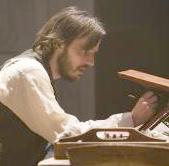SEARCH
REVIEWS
FEATURES
NEWS
Etcetera and
Short Term Listings
LISTINGS
Broadway
Off-Broadway
BOOKS and CDs
OTHER PLACES
Berkshires
London
LA/San Diego
Philadelphia
Elsewhere
QUOTES
On TKTS
LETTERS TO EDITOR
FILM
LINKS
MISCELLANEOUS
Free Updates
Masthead
Writing for us
A CurtainUp  London Review
London Review
 London Review
London ReviewThe Wild Duck
|
If you take the life-lie from an ordinary man then you take away his happiness as well
---- Relling |

Paul Hilton as Hjalmar Ekdal
(Photo: Johan Persson) |
Michael Grandage's directorship of the Donmar Warehouse has given us a season of consistent excellence and this superb production does not fail to live up to its predecessors. David Eldridge's slick new translation is unaffected and timeless, successfully managing Ibsen's fluctuating tone which leaps from domestic mundanity to abstract symbolism.
The set, designed by Vicki Mortimer, is aesthetically superior but also conveys class consciousness with a delicate touch. The play begins in an austerely grand reception room with tall dominant green panels, and then shifts to the considerably more modest apartment belonging to the Ekdal family. This is humble, clean and homely, and as is appropriate to a photographer's studio, sensitive to daylight. Stairs onstage lead up to the loft where a menagerie is housed, including the eponymous, symbolically-charged duck.
Within this set, the actors move with naturalistic expertise. Maintaining the illusion of a household, the family use the appropriate entrances and exits even when unprompted by the text. Paul Hilton plays the protagonist Hjalmar Ekdal with scrawny charm. He is boastful, egotistical, finds eating engrossing ("I haven't had a solid meal for a whole day"), lazy and impractical but also, thanks to Paul Hilton's skill, extremely likeable. Bearing out Ibsen's desire that The Wild Duck be played as a tragicomedy, the audience will laugh at his flaws but feel for his tragedy.
His wife Gina (Michelle Fairley) is the pragmatic cornerstone of the Ekdal family, an effective krona-counting housekeeper and indulgent to her less than perfect husband. Their child, the innocent but intuitive Hedvig, is always a difficult part to play well. The diminutive Sinéad Matthews, however, convinces us of Hedvig's youthful purity by emphasizing the 14 year old's childishness. Hjalmar's wizened father (Peter Eyre) lives with his son and a shameful past. Convicted of illegal tree cutting, he lost his fortune, his reputation and a little of his sanity. He now spends much of his time in the loft, shooting the pet rabbits, in a recreation of his bear-hunting exploits of earlier years.
Ben Daniels is an understated Gregers Werle, whose uncompromising dedication to the truth irrevocably unsettles the Ekdals' happiness. He bears a rigid adherence to "the claim of the ideal" with misguided complacency which Relling identifies as "an acute condition, a fever, called I'm always right". Ben Daniels was last seen at the Donmar playing another disruptive intruder in The God of Hell, and this association throws a warning echo of menace on this more subtle villain. In fact, his performance is finely balanced between the naive and the sinister. Only Relling (Nicholas Le Prevost) incisively sees through Gregers' idealism to its pernicious consequences. Le Prevost sympathetically plays this drunken doctor of wasted promise who is actually a kind of down-to-earth saviour.
This production is exemplary in every possible way, and the cast are of such a definitive standard that it becomes difficult to imagine others now embodying these characters. The first-rate translation and all-round quality of Michael Grandage's latest offering skilfully brings out the relevance of The Wild Duck's controversial dilemma, that of truth versus delusion. The Donmar is fast becoming the West End's most reliable theatre with plays that engage in the issues of today's society with assured professionalism.
| THE WILD DUCK
Written by Henrik Ibsen Translated by David Eldridge Directed by Michael Grandage Starring: Ben Daniels, Paul Hilton, Peter Eyre With: John Atterbury, Peter Caulfield, Susan Brown, Richard Syms, Sean Jackson, William Gaunt, Michelle Fairley, Sinéad Matthews, Nicholas Le Prevost, Sean Jackson Design: Vicki Mortimer Lighting: Neil Austin Music and Sound: Adam Cork Running time: Two hours 40 minutes with one interval Box Office: 0870 060 6624 Booking to 18th February 2006 Reviewed by Charlotte Loveridge based on 16th December 2005 performance at the Donmar Warehouse, 41 Earlham Street, Seven Dials, London WC2H 9LX (Tube: Covent Garden) |





